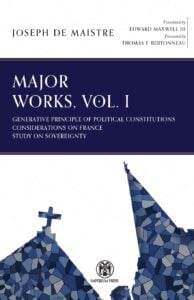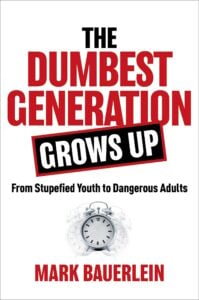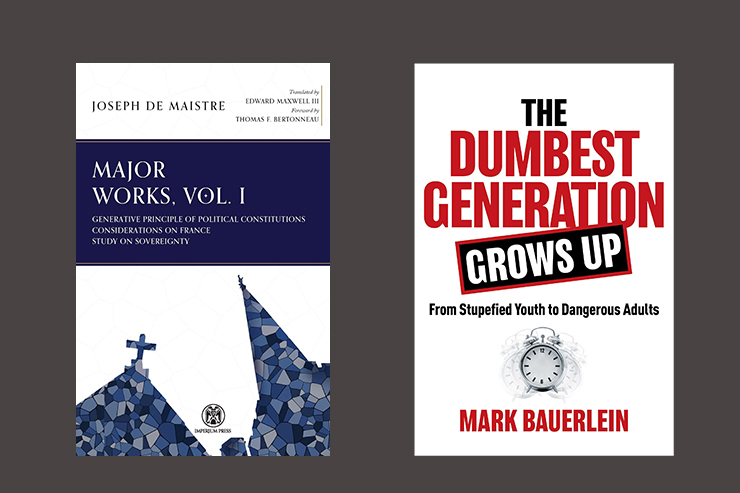
Major Works, Volume I, by Joseph de Maistre (Imperium Press; 348 pp., $23.00). As the godfather of the French counterrevolution, Joseph de Maistre savaged egalitarianism in Study On Sovereignty, reflected upon the pre-political underpinnings of society in The Generative Principle of Political Constitutions, and—most famously—meditated upon the apocalyptic French Revolution in Considerations on France. Often accused of being a proto-fascist by later critics, Maistre did not so much glorify violence and coercion as recognize them to be perennial features of man’s fallen condition.
“There is only one way to restrain the plague of war,” Maistre argued, and that is “to restrain the disorders that bring about this terrible purification.” While liberals indulged feverish appetites and placed their hopes in utopian schemes of world government, Maistre insisted that men need piety, prudence, and temperance.
Nor was the monarchist Maistre dogmatically hostile toward republics. He conceded that “in popular governments there is more action, more movement,” and that such energetic regimes invariably “give birth to a dazzling group of great men whose deeds give to its history an inexpressible charm and interest.”
What Maistre did reject is the now-common assumption that democracy is suited for all nations. He issued a warning that strikes at the heart of the dilemma faced by 21st-century America. In a republic, he wrote, “the working of sovereignty must be supplemented by public spirit, so that the less wisdom a people has in perceiving what is good, and the less virtue it has in doing it of its own accord, the less it is suited to a republic.”
Tacitus, Dante, Plato, and the Bible inform Maistre’s pen. The reader may also gain new insights from his jabs at Jean-Jacques Rousseau and Voltaire, whose works he meticulously studied, though he deemed them both detestable. For Maistre, it was perverse on the one hand to damn the Jacobin thugs for their murderous rampages, while on the other, to praise the Enlightenment ideas that had paved the way for the revolutionaries. “The tiger who tears does what he must: the real culprit is the one who unmuzzles him and sets him upon society.”
In his introduction to this Imperium Press edition, Thomas Bertonneau explains Maistre’s theory that “with religion, in fact, language is one of two primordial institutions that constitute man qua himself.” It is not difficult to see how this theory applies not just to the Revolution but to our own time, which has seen even more abuses both of language and of man.
(Jerry Salyer)

The Dumbest Generation Grows Up: From Stupefied Youth to Dangerous Adults, by Mark Bauerlein (Regnery Gateway; 256 pp., $29.99). As recently as the late 1990s, certain lucky American high schoolers learned the classics from A Reading Course in Homeric Greek, a revered text continuously in print since the 1940s. A knowledge of Greek, the book asserted, enhanced “the refinement of mental powers, [and] the expansion of spirit and ennobling contact with great minds.” It continued:
Greek may not teach you a living, but it will teach you how to live. And if the purpose of education is to prepare you for living in vital contact with the best things in man’s great inheritance … then Greek is the most practical subject in school.
Mark Bauerlein has chronicled how far American society and university humanities departments have fallen from such noble aims. In this sequel to his 2009 book, The Dumbest Generation, Bauerlein indicts academia, the media, and American cultural leaders who have proffered a series of simplistic, utopian nostrums that betray philosophical nihilism and demonstrate the dangers of life lived in virtual reality.
Bauerlein’s apt examples illustrate the demise of intellectual competence and the absence of a coherent cultural tradition that plague the millennial generation. Today, we reap the seeds sown at Woodstock. Late-1960s hip professors and cowardly college administrators avoided dogmatically deciding what ought to be read and studied by those under their tutelage, who ostensibly paid for their expertise.
Just as the psychedelic ’60s warped every aspect of society, nothing became more dogmatic than the educational aristocracy’s anti-dogmatism. Reading is out; screens and social justice are in. The elite’s platitudinous slogans embraced unquestioningly leads to the cancellation of those who stray from accepted thought.
Bauerlein’s most incisive observation—the disappearance of a literate, reading public—will horrify those who agree with Calvin Coolidge’s view of education as the “handmaid of citizenship.” By neglecting literature, many millennials will never understand the human condition and, as a result, will never live well. Yet they also crave an inheritance, a true tradition to call their own. Unfortunately their elders looked away as screens, social media, and narcissism conquered a generation.
(John M. DeJak)

Leave a Reply